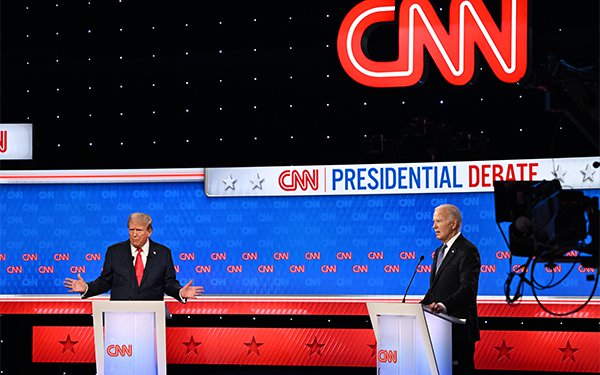
Last Thursday night’s presidential debate was a train wreck, but everybody has already commented on that.
And they still
are. But what amazes me is that this debate did not soar into the viewership stratosphere to seize the top spot in the history of televised presidential debates.
The audience across 17 broadcast and cable channels was estimated at 51.3 million.
Before the
debate, I would have bet my bottom dollar that this particular debate would break records.
Although a measurement of the pre-debate hysteria was not possible
(to my knowledge), it seemed to me, and possibly many others, that no presidential debate in history was as hyped and anticipated as this one.
advertisement
advertisement
So why
wasn’t it the highest-rated in history? Perhaps the answer is simple: Hype does not necessarily translate into viewership.
How soon we forget. I cannot
recall the hype cycle that must have attended the first debate between Donald Trump and Hillary Clinton in 2016, but it may have been louder than this one. Or maybe not.
That debate emerged as the most-watched presidential debate ever, with an estimated audience of 84 million. The
record still stands.
Two other Trump debates also far out-scored last week’s clash with President Biden. One of the 2020 Trump-Biden debates had an estimated audience
of 73.1 million -- the third best in history.
A Trump-Hillary debate in 2016 was fourth best with 71.6 million viewers. (Number 2 on the list was a 1980 debate between Ronald Reagan
and President Carter -- 80.6 million.)
So why wasn’t last week’s Trump-Biden faceoff in that group? A couple of reasons occur to me.
One reason may have been the June date of the debate. I read somewhere it was the earliest televised presidential debate in recent history.
Maybe the debate-viewing public was not as interested in a debate held so long before Election Day.
Another reason,
based on some anecdotal evidence: It could be that many people who formerly may have been eager to watch a contentious presidential debate (as evidenced by the audience data for previous debates cited
above) have thrown up their hands this time around in frustration and/or disgust.
With that mindset, the last thing they felt like doing was waste an evening
rubbernecking at a train wreck. This group may have stayed away simply to avoid aggravation.
Having said all that, and despite the fact that viewership for
this debate was 39% less than the 2016 Trump-Hillary record, 51.3 million viewers is nothing to sneeze at.
But did last week’s debate, or any of the
others mentioned above, actually succeed in changing hearts and minds?
Or more to the point, after last
Thursday’s spectacle, did undecideds suddenly decide how to cast their votes?
This seems doubtful. For
one thing, neither candidate came off well, even if the lion’s share of the post-debate coverage was all about Biden and the impression he gave of a senior citizen who maybe should give serious
thought to retirement.
However, as unsettling as Biden’s demeanor was for many, those who have already decided to vote for him do not seem like the
kind of people who will suddenly go the other way and vote for Trump.
They detest Trump so much that is hard to picture them
pulling a lever or filling in an oval for him, no matter how grave their doubts about President Biden’s cognitive abilities.
So, if this debate does not
persuade voters to switch sides and in the process tip the scales for either candidate, what purpose do these presidential debates serve in the first place?
The view from here is that they are here merely to amuse and entertain the masses, who have given up on expecting anything better.